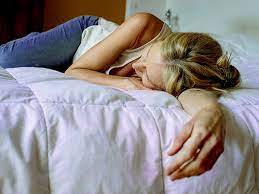Sleep deprivation is a common problem in today’s lifestyle, but it is important to pay attention to it. It can also affect your mental health. Irregular diet, work stress, day-night working style, all these affect our sleep. And it also affects our personal life, due to lack of sleep, our behavior becomes irritable, we get angry, fret. Now this problem has also been seen in the students. A new study has found that lack of sleep affects the mental health of students. About 65.5% of the students in the study experienced poor sleep and it was linked to mental health problems. According to a study published in the peer-reviewed journal Annals of Human Biology, the risk of suffering from depression is almost 4 times higher than those from inadequate sleep habits.
According to the researchers, this study revealed that EDS i.e. Accessive Daytime Sleepiness was a problem among 55 percent of the students. Let us tell you that excessive daytime sleepiness means excessive sleepiness during the day. Because of this, they were almost twice as likely to experience depression or moderate to high stress levels.
Furthermore, the study highlights the gender division, sleep deprivation and EDS have been found to be more in women. Its conclusion is that women are more affected by mental health due to lack of sleep.
Dr. Paulo Rodrigues, Head of the Faculty of Nutrition at the Federal University of Mato Grosso Brazil, who was involved in this study, says that sleep disorders are especially harmful for college students, because they are associated with many negative effects on academic life. He said that because of this, students have to face problems like difficulty in concentrating, being absent in college.
Dr Paulo Rodrigues said that the university environment increases the risk of academic stress and social life such as compromising sleep habits. He said that university managements should plan for institutional action and implementation of policies. This will encourage the development of activities that will help promote good sleep habits and benefit the mental health of the students.
In the study, the researchers included 1,113 undergraduate and postgraduate students in the age group of 16 to 25 years. Under the study, participants were asked about their sleep quality, EDS, socioeconomic status and their body mass index (BMI) was also assessed. Based on this, an association between poor sleep quality/EDS, and depressive symptoms and perceived stress levels was estimated.
 Indian Thought Latest News & Views
Indian Thought Latest News & Views

